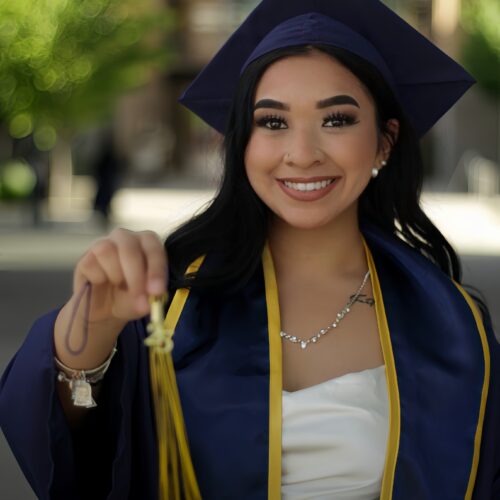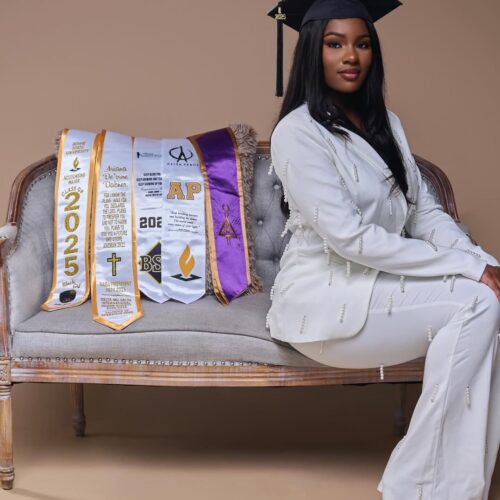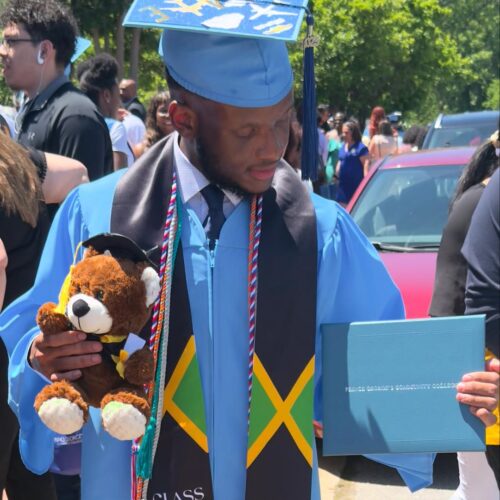On April 20th, 2022, PeerForward’s Leadership Council hosted a virtual fundraising event celebrating “The Power of Peer Leadership.” We are thrilled to announce that through the generosity of our donors, we surpassed our fundraising goal of $12,000, with a total of $12,413 in donations.
Throughout the event, we heard from current Peer Leaders, alumni, staff, and Leadership Council members. In one of the evening’s highlights, PeerForward CEO Gary Z. Linnen sat down virtually with PeerForward alumnus and Founder and CEO of Brothers@, Dariel Vasquez. The two leaders reflected on the role of peer-to-peer support in their lives, as well as how we can leverage peer influence to achieve educational equity. Read on or watch below for the full interview.
Gary: Good evening. Dariel, it’s good to see you!
Dariel: Good to see you! Honored to be here.
Gary: I’m honored to be in this space. You are doing phenomenal things as a young man of color, and it’s important to keep doing the good work, the hard work, because we need individuals like you. For individuals that don’t know, Dariel Vasquez is an alum of College Summit (PeerForward) who I had the honor of meeting a number of years ago at Monmouth College. And I’ve watched this young brother, while he was in high school, shaking the table with young men and letting them know their worth, their value.
I’ve then seen him progress to Bard College, where he took that same energy, that same mentality, that same essence of why it’s important to make sure that we’re tapping into young men of color and getting them to realize their worth. He did that at Bard College. He brought then-College Summit, now-PeerForward, with him throughout that journey, but he never stopped. And then even after he graduated from Bard, he took that same methodology and kept the same organization and took it to another level. So the same methodology of Brothers@ Thurgood Marshall and Brothers@ Bard College. It’s now Brothers@, which is about to go national, and I’m honored to have you in that space, so welcome Dariel.
That’s my intro for you, but go ahead and introduce yourself and tell us how you got connected to PeerForward.
Dariel: Thank you so much for the intro, Gary. It’s crazy to have this full circle moment: more than my being an alum of PeerForward, also being able to speak on a panel with you, your having been my rap director, and how influential you’ve been in my life since I was 16 years old, so thank you for that.
I’m from the best place in the world, just like you – I’m from Harlem. I’m a first-generation college graduate, so it was a big deal for me to go away to college, graduate, get the degree, become one of the top breadwinners if not the top breadwinner in my family, and create that generational shift. My life story and trajectory from the projects in Harlem to where I live today captures the kind of impact we try to have on the young men that we work with at Brothers@. You summed it up perfectly. I see Brothers@ as the next iteration of taking college access work and specifically focusing on what it looks like when we do persistence work in higher ed. How do we not just get young people to college, but through college, particularly young men of color?
It all started with my summer experience at College Summit back in 2012 at Monmouth, like you mentioned. You were my rap director, and in the rap sessions my peers and I were able to reach a level of vulnerability that I’d never experienced. I’d never experienced a safe space like that before. So even at that young age, before my senior year of high school, I was already thinking about, “how do I try to bring that to my high school, to middle schoolers in my neighborhood, and then eventually, how do I bring that to my college campus?” So that’s how my experience with College Summit ties with how I launched my organization and the work we do today.
Gary: Great, thank you Dariel. You talk about the importance of what you learned at our summer workshops and this idea of vulnerability. When we’re thinking about what’s happening in the country right now, and the need for education equity, why is it so important today to leverage peers to support you, to build community, to have desired outcomes?
Dariel: Amazing question. I almost dropped out my first year of college, even having all the supports, all the mentors, all the positive figures in my life. Coming from Harlem and going to a predominantly white institution, trying to navigate an institution that wasn’t designed for folks like us – the barriers I was coming up against made me think about what had gotten me to that place, that position, in the first place. And it wasn’t necessarily getting that best piece of advice from older folks in the neighborhood or from my schools, it was really the kind of support that I got from my peers and my friends. It was the folks that I could most relate with, who I knew had this shared lived experience and were going through it with me in real time. We come from similar neighborhoods, we may not have had the exact same upbringing, but we’re both here sitting on this campus, we’re both trying to go through this, and just having that as the baseline allowed for us to be able to support each other on the next level.
I apply that to our methodology around peer-to-peer leadership and peer-to-peer mentorship for young people. My idea is, having a 19- or 20-year-old college student from the South Bronx mentoring a 15- or 16-year-old and telling them, “I’m from the same neighborhood, I listen to the same music as you, I’m on the Gram just like you, but I just studied abroad in France,” that has a totally different impact and influence on a young person, especially when we try to open up their horizons of what they see as true possibilities in their lives and unleash their potential. Young people can do that for each other better than anyone.
Gary: As a young CEO, how important is it for you to make sure that you’re leveraging individuals in your circle to support you?
Dariel: It’s critical. It’s almost common sense, that folks in my peer group who I have shared experience with tend to be the ones that I lean on the most. I can’t underscore this enough: it means a great deal to me to have you in my life as a CEO who is a man of color from the same neighborhood I’m from. You can’t compare that to anything. I can look at you and be like, “Gary’s doing it, I can do it.” Regardless of what phase of life I’m in, I’ll always have those reference points to say, “someone has a shared experience, they’re doing it, I can do it too.”
Gary: Thank you, Dariel. I’m honored, and I look up to you, to watch how you’re innovating in this space. I can’t wait for us to continue to collaborate and be able to do great things, to be able to support our students in New York City and across the country. I’m going to hit you with a hot question, and you’ll have 15 seconds to respond: Why college? Do you think it’s still important today?
Dariel: I do. You saved the question we could spend all night on, for the last 15 seconds! I think college expands horizons. I was able to see the world when I was in college. I went from my neighborhood in the projects to being in places and connecting with people and networks that I probably never would have connected with. I’ve been to places in the world that I didn’t even know how to find on a map. All of these things because I went to college, and that’s exactly what I’m seeing with the guys that we work with, and that’s exactly what they’re seeing, too. They would have never been to those spaces; they would have never experienced those things. So it’s more than just the experience in the classroom; it’s the overall experience that college can provide. I think the question now is, how do we make these colleges and institutions really equitable spaces and safe spaces for our young people?
Gary: Definitely. It’s a systemic barrier that we’re seeing and a challenge. Our young adults are not playing, they are holding us to the fire to say, “if this system does not change now, if you’re with me or not, I’m going to do it on my own,” and that’s why it’s important that we leverage the power of peer influence, to make sure that we’re doing it as a community.
Dariel: I do have one question for you – I’m not going to let you off the hook! I’ve touched on the importance of seeing you as a mentor and a role model. As a man of color being in the CEO position, what does that mean to you and what do you think that means for the future of PeerForward, having you in leadership?
Gary: I’m excited to be able to lead PeerForward along with all my teammates, my colleagues, on this next chapter. I stand on the shoulders of three wonderful founders who saw something, they were visionaries: Derek Canty, Keith Frome, J.B. Schramm. They saw something in the power of young adults, and the ability to be able to lean on that, to lean into it, is equally exciting. Particularly in a space where representation is key. It’s important that our young folks are seeing folks like us, and that we hold positions of power, have the ability to be able to effect change, and are coming in in places of authority.
I’m excited about that, but I don’t do it alone. I do it with 24 bright young staff members, along with hundreds of volunteers across the country, and supporters that are on this call right now that provide us that space to be able to dismantle the educational inequities that we’re seeing across the country. So, I’m excited! It’s given me a number of gray hairs, which is cool, but I will leave with this: Every day that I get up and I look at my two little ones – they’re 20 months old and 4 months – it reminds me that I want to make sure that when I leave this earth, that I did everything that I could to build a better space for them, and if I don’t do that, I’m doing them a disservice. I have to live with that every day, and I live and breathe that through the work that we do. That’s the essence of what PeerForward is, it’s about going from self to service, it’s what Brothers@ does: self to service in order to be able to adjust our communities. That’s why I love what I do.
So, folks on the phone, support, support, support, please!
Dariel: Love you so much, man, I just wanted to say that.
Gary: Love you too, I’ll see you in the city soon.











